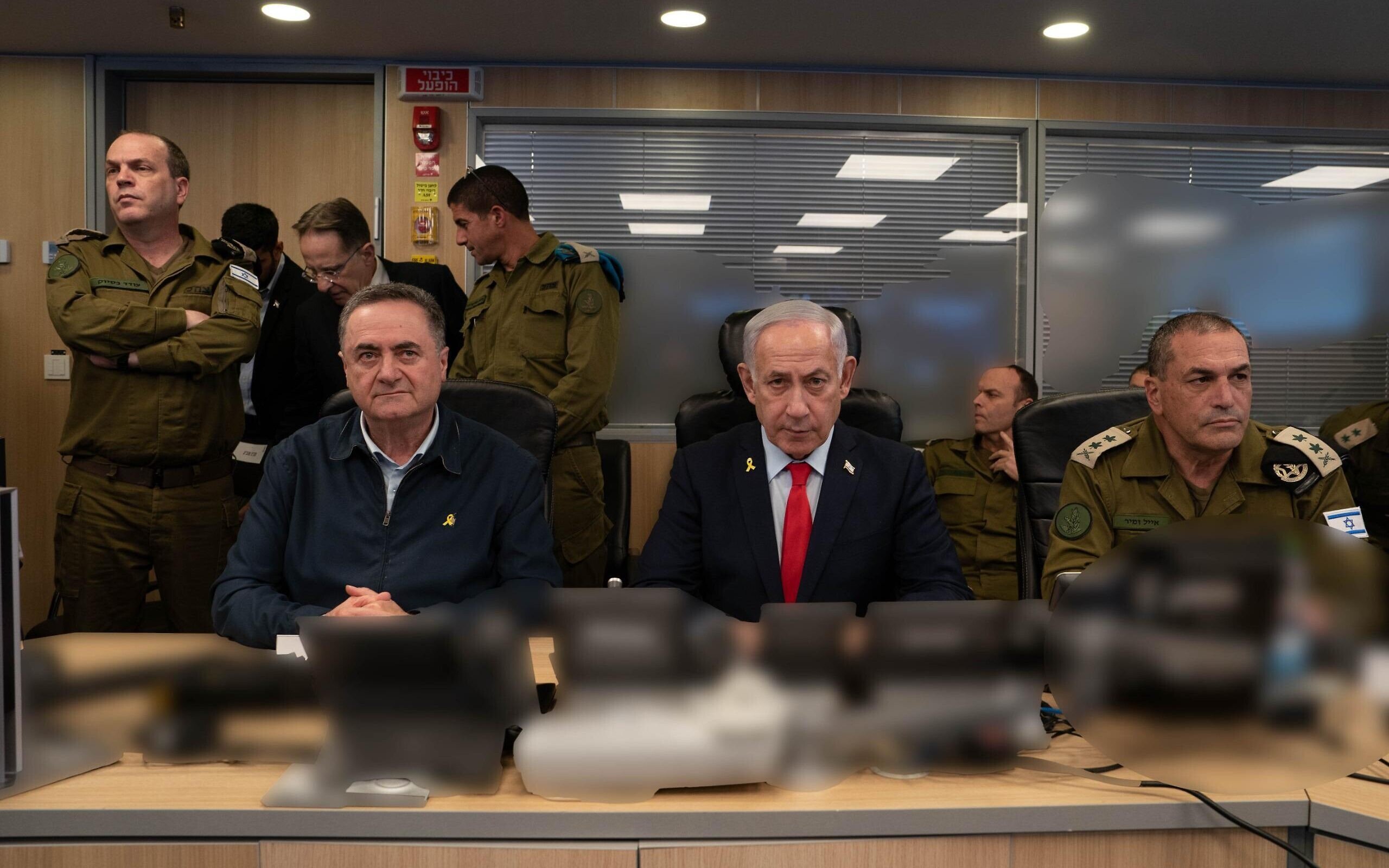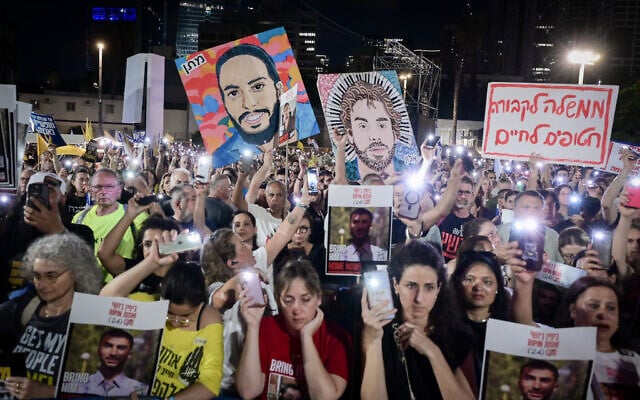



The head of the military reportedly upbraided Prime Minister Benjamin Netanyahu and other assembled lawmakers during a contentious meeting Sunday night, accusing them of only now deciding to seriously tackle the Hamas terror group as justification to widen the military campaign and shirk a possible hostage release deal.
The comments from Israel Defense Forces Chief of Staff Lt. Gen. Eyal Zamir, reported by Channel 13 news Monday night, underlined the growing rift between the country’s leadership and the commander of its army as the government pushes ahead with a controversial plan to conquer Gaza City rather than pursue a ceasefire arrangement that could see at least half of the remaining hostages freed.
The IDF was set Tuesday to start gradually calling up 60,000 reservists needed for the large-scale operation, despite concerns about manpower and troop fatigue after nearly 23 months of war following the October 7, 2023, Hamas attack.
“Good morning, sunshine,” Zamir is reported to have told the high-level security cabinet with sarcastic exasperation during the Sunday night meeting. “You [were] the cabinet on October 7. Now you remember to talk about defeating Hamas? Where were you on the 7th? The 8th? The 9th? Now you remember, after two years?”
According to Channel 13, Zamir’s outburst came after Cabinet Secretary Yossi Fuchs asked ministers to explain why they now were insisting on pursuing the defeat of Hamas.
Previous reports had already portrayed the cabinet meeting as particularly stormy, with Zamir pressing for ministers to at least consider the deal on the table and warning that the military operation could bog the IDF down in the Gaza Strip for an extended period, leaving it in charge of a full-fledged military occupation.
Throughout the war, Prime Minister Benjamin Netanyahu has insisted that Israel’s goals are the defeat of Hamas and the return of the hostages. Nonetheless, the campaign has so far failed to dismantle the terror group, with the Iran-backed organization still able to mount attacks on troops and maintaining levers of power within Gaza.
Hamas and its allies continue to hold 48 hostages, at least 20 of whom are believed to be alive.
Zamir took the reins of the army from previous head Herzi Halevi in early March, just as Israel ended a two-month ceasefire with Hamas that had seen dozens of hostages freed. During the pause, the terror group was thought to have replenished much of its depleted force of thousands of fighters.
“When I moved into this position, Gaza was not defeated,” Zamir said, according to the report. “Today, 70 percent of Gaza is defeated.”
According to earlier reports, the meeting saw a number of tense exchanges between Zamir and lawmakers, who have insisted on pushing ahead with the Gaza City offensive despite opposition from Zamir and other senior defense officials.
“You are heading to a military government,” Zamir said during the meeting, the Ynet news site reported. “Your plan is leading us there. Understand the implications.”
According to Channel 12 news, Zamir also told cabinet members that “there is a framework on the table, [and] we must take it.”
However, Channel 13 news attributed the quote to Mossad chief David Barnea, who has been heavily involved in indirect negotiations with Hamas for a hostage release and ceasefire agreement.
Comments from cabinet meetings are regularly leaked to members of the Hebrew-language press, who generally report them without attribution.
According to several reports, Netanyahu shut down any discussion of a hostage deal during the marathon meeting, saying it was not on the table and that US President Donald Trump had pushed him not to accept a partial deal.
The government has advanced the takeover plan in recent weeks despite the Hamas terror group saying several weeks ago it had agreed to a phased hostage-truce deal almost identical to one Israel had previously approved. In the interim, Jerusalem had officially given up on phased deals, demanding a comprehensive agreement to return all the captives in one go and see Hamas surrender.
The deal — which Hamas said it agreed to on August 18 — would see 10 living hostages released and the remains of 18 dead hostages returned, in exchange for the release of hundreds of Palestinian security prisoners and some 1,000 Gazan detainees, and a 60-day ceasefire, during which negotiations would be held for the return of the remaining 20 hostages, of whom 10-12 are believed to be alive, and a permanent end to the war.
The IDF chief of staff reportedly told ministers that Operation Gideon’s Chariots — the IDF offensive launched after the previous hostage-truce deal collapsed, which ended with the military in control of some 75% of Gaza — created the conditions for the hostages’ return.
Moreover, he said, the IDF is capable of returning to combat if the deal goes through and no resolution to the war is agreed to after the 60-day ceasefire ends.
However, Netanyahu argued that retaking territories Israel retreats from during a potential ceasefire could take six months and cost the lives of soldiers, while also warning that the US might not back a resumption of fighting.
The reports on the growing schisms over Gaza have come as Israel is set to start calling up reservists, some of whom have already done multiple tours in the Strip or in support of the war.
The 60,000 troops expected to be called up Tuesday and over the coming months will be deployed to fronts across the country, as the IDF moves more active and reservist troops to Gaza ahead of the planned offensive.
Around 40,000-50,000 reservists are slated to report for duty on Tuesday, the IDF said last month. Another wave is slated to take place in November-December, and a third wave in February-March 2026.
The number of reservists being called up is in addition to tens of thousands of reservists who are already serving.
The IDF is also extending reserve duty for some 20,000 reservists who are currently on duty by another 30-40 days, bringing the total number of reservists at a given time during the offensive to around 130,000.
The army experienced an unprecedented 120% turnout rate for reservists on October 7, when Hamas carried out a surprise attack on Israel, killing some 1,200 people and taking 251 hostages to Gaza, but participation is now less than half that, according to the military. The decline stems from exhaustion and economic hardship after months of repeated call-ups, anger over Haredi draft exemptions, and a loss of trust in the government, which many believe is motivated by politics and lacks strategic direction.
According to Channel 13, the IDF believes around 100 soldiers will likely be killed in the upcoming offensive, bringing the death toll among troops during the war to over 1,000, including those killed on the northern front.
Aside from Zamir, families of hostages have also opposed the offensive, which they fear could put their loved ones in danger or kill any chances for a future agreement, instead pushing for Israel to reach an agreement ending the war and freeing all of those still held in Gaza.
Humanitarian groups and others have also warned that the military campaign will intensify hunger and other crises in the Strip, with hundreds of thousands in Gaza’s largest city set to be displaced, despite insufficient aid infrastructure.
Over 63,550 Palestinians have been killed in the war, according to Gaza’s Hamas-run health ministry, whose numbers cannot be verified. The ministry does not differentiate between civilians and combatants in its count.
According to reports, during the Sunday meeting, Foreign Minister Gideon Sa’ar and Intelligence Minister Gila Gamliel joined Zamir in supporting the deal, citing among other reasons the diplomatic headwinds that Israel is facing amid a wave of Western allies recognizing a Palestinian state and growing international anger over the humanitarian situation in Gaza.
Likud minister David Amsalem reportedly warned that the planned expansion of the war could turn Gaza “into Israel’s Vietnam.”
Despite the clashes, Zamir reportedly told the cabinet that the IDF will carry out whatever instructions it receives from the political leadership, even if it disagrees with them — winning him plaudits at the meeting, according to the Israel Hayom daily.



